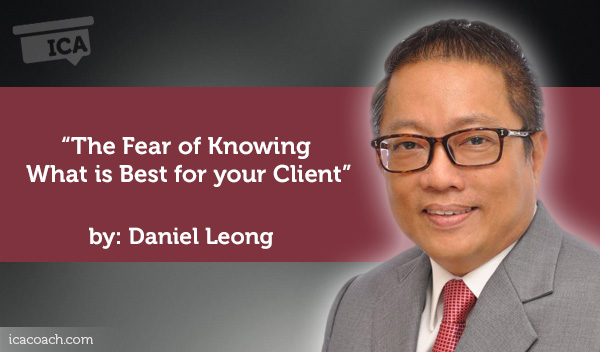
Coaching Case Study By Daniel Leong
(Career Coach, SINGAPORE)
Introduction
The role of a coach is to work with clients so that they meet their objectives/goals. Coaching is like a journey, in which the coach travels together with the client to reach their destination. The clients are the drivers and the coach are like a GPS, providing direction so that they can reach their destination (goals) at their pace. The client makes choices working with the coach and it is never the coaches job to state where they should go or how to get there. The client through the support of the coach makes that decision after a journey of self-discovery. At some point in time in the journey, the client will feel stuck, the coach, like the GPS, will recalculate/re-calibrate with the client, so that they can move forward.
What do new,and sometimes even seasoned coaches fear during their coaching sessions?
There are assorted reasons as to why the above fears may exist, but I would like to think that it had to do with the “transplantation” effect in which Coaches believe that from their experience and knowledge, they can feel and see what the client issues are and that there is already a solution. By transplanting these beliefs onto the client, we effectively negate the coaching principles.
Clients also come with pre-conceived ideas and it is than up to the Coach mastery of the Coaching process to guide and ensure the Client make relevant progress.
Coaching Scenario
Jimmy was recently retrenched and have remained unemployed for close to 3 months. He is 54 years old and he came with a pre-conceived idea that it would be very difficult for him to re-enter the job market due to his age. With that in mind, he decided that going into business would be his best option. He is leveraging on his skills, contacts and experience from his previous position as a Sales Director to start a similar business. If that plan fails, he would like to become a consultant. And finally, to look for freelance work.
Coaching Sessions
During the first coaching session, I established the ground rules with Jimmy as follows:
We began with an exploration ofhis goals and objectives. Jimmy discussed at length on his current situation and how he plans to move forward, that is, to work on 3 plans – starting a business, become a consultant, freelance work. As there were 3 options, I asked him what his priorities were. He responded by saying that he would want to start a business. On further questioning, he explained that he already had in place a brief business plan and he does not see the need for a detail plan. Also, he had shared this brief plan with potential investors and that a scheduled meeting will be held within 2 weeks. I practice active listening skills throughout the session, but I found myself thinking of solutions and how his business plan would have looked like. I had to check myself every now and then and to re-focus.
Though I did not interrupt him in any way, I found that my mind was already in the “solution mode”. What was going on in my mind? The following were some of the questions “popping” in and out:
I had the good sense to put them away and continue to focus on Jimmy and to ask further relevant questions. For more clarity, I re-frame the above questions into more probing questions, to better understand Jimmy’s perspective. The answers I got from Jimmy were mainly due to resource issues and although he has a partner, he was doing most of the work and meeting up with the potential investors. But he did not view this as a problem and believed that he can convince the investors base on his brief business plan.
In the next session, Jimmy provided an update on where he was with the potential investors. True enough, they wanted more details and now require him to provide them with both a detailed business plan and a one pager. My mind again went into “action mode”. It was very eager to develop solutions for Jimmy rather than playing the role of a Coach. Once again, I had to checked myself. After allowing him to complete his update, I decided to do the following:
Reflection
As someone starting out in the Coaching process, there is a tendency to drift into the “transplantation” mode. How do I overcome this and what are the watch outs?
I am glad that the sessions went well with Jimmy and I did not at any time relapse into letting my mind lead the sessions. Just creating this awareness was a great learning experience for me to take away into future sessions as I continue my coaching journey.